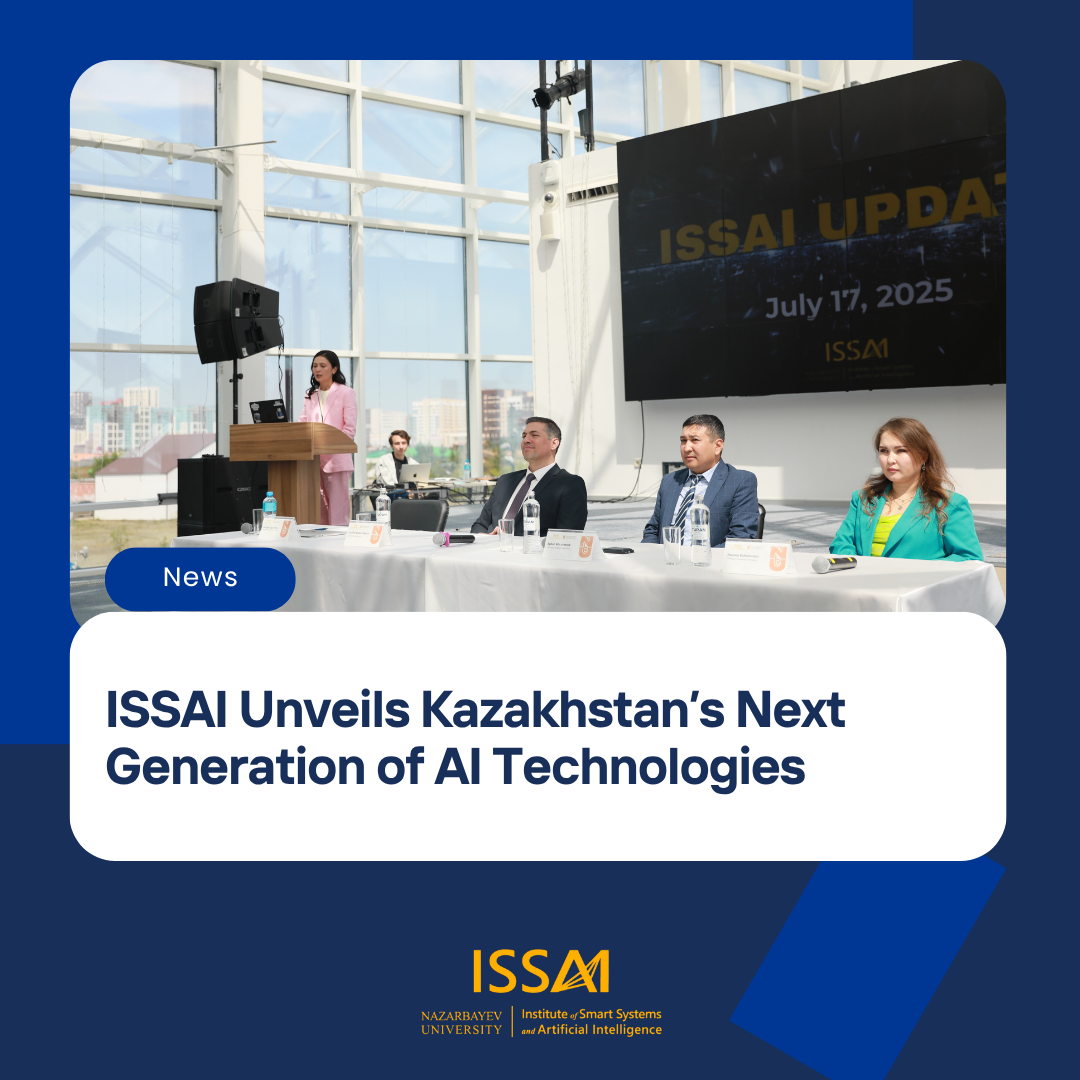ASTANA – July 17, 2025 — The Institute of Smart Systems and Artificial Intelligence (ISSAI) at Nazarbayev University has unveiled a new suite of artificial intelligence technologies designed, developed, and deployed entirely by Kazakhstani professionals.
The systems presented during the press briefing mark a significant leap in Kazakhstan’s journey toward self-reliance, cultural alignment, and infrastructure independence for Artificial Intelligence.
Following the presentation of the KazLLM large language model in December 2024, ISSAI now introduces five breakthrough products that place Kazakhstan at the forefront of culturally grounded and linguistically inclusive AI.
A Milestone Toward Building Self-Reliant AI
“Everything unveiled today is the result of local innovation — from data collection to engineering and deployment,” said Dr. Huseyin Atakan Varol, Founding Director of ISSAI. “This marks not only a technological milestone, but a cultural one. Kazakhstan is proving that it can build state-of-the-art intelligent systems for its own people, in its own language, on its own terms — powered by the talents of local researchers, engineers, and data scientists.”
Technologies Unveiled
Oylan 2.5 — Multilingual Multimodal AI Assistant with Additional Latin Script Support
Oylan 2.5 is ISSAI’s powerful AI assistant capable of operating in Kazakh, Russian and English languages. The new version enables the users to interact with this model using the Latin script for Kazakh in addition to the Cyrillic script. With Oylan 2.5, users can:
● Ask questions via text or voice and receive detailed answers
● Upload images for analysis (e.g., homework, diagrams)
● Respond both in Cyrillic and Latin scripts to queries in Kazakh
● Retrieve trusted online or document-based information
● Display math formulas or code — ideal for students and developers
MangiSoz 2.0 — Speech Recognition, Synthesis and Translation Engine
A robust system for real-world speech processing, MangiSoz 2.0 provides:
● High-accuracy speech recognition and synthesis in Kazakh, Russian, English, Turkish, and Chinese
● Natural-sounding text-to-speech, speech-to-text translation mode in male and female voices for these five languages
TilSync — Real-Time Subtitling and Translation Tool
TilSync enables seamless communication across languages and platforms:
● Live subtitling and audio translation with low latency
● Integration with video conferencing tools and streaming systems
● Translation between Kazakh, Russian, and English
Beynele — Culturally-Tailored Multilingual Image Generator
A generative AI model trained to create culturally relevant visuals from Kazakh, English, and Russian prompts:
● Produces images from text prompts in multiple languages
● Embeds Kazakh themes, attire, symbols, and landscapes
● Supports content creators, educators, and media professionals
● Empowers cultural sovereignty in visual storytelling
Mangitas 02 — Inference Server for Localized and Secure AI Deployment
Custom-built AI hardware for secure and localized model inference:
● High-performance inference server for local deployment
● Eliminates cloud dependency — ideal for data-sensitive sectors
● Enables full AI functionality in schools, local data centers, and government institutions
● Powers critical AI entirely within national borders
● Ensures fully secure, compliant, and cloud-free AI inference
At the press briefing, ISSAI Executive Director Yerbol Absalyamov emphasized: “MANGITAS, an inference server configured entirely in-house at ISSAI, is a locally built alternative to traditional supercomputers. While ISSAI strongly welcomes and supports the government’s initiative to bring in high-performance computing systems, many of these rely on imported components currently under international sanctions. In contrast, MANGITAS was developed using domestic available hardware and represents ISSAI’s full proprietary know-how. Although its processing power may be more modest, it stands as a powerful example of how Kazakhstan can offer independent, homegrown technological solutions—bypassing external restrictions and contributing to national digital sovereignty. Currently, all ISSAI’s models can be deployed on Mangitas and ISSAI is ready to work with other entities to configure Mangitas for their needs”.
Amina Baikenova – IT product manager at ISSAI pointed out during the presentation: “Inference server Mangitas, developed by the ISSAI team, is a high-performance server that operates in a closed, secure environment, ensuring maximum data protection and confidentiality. Several Kazakhstani enterprises are already utilizing Mangitas within isolated IT infrastructures, demonstrating its reliability and suitability for sensitive operations“.
This progress has been made possible by the intellectual workforce nurtured by Central Asia’s leading research university — Nazarbayev University — and other top institutions across Kazakhstan.
The main focus identified by NU researchers is the development of AI solutions that deliver real benefits, have practical value, and address both local and global challenges.
ISSAI expresses gratitude to the “Social Development Fund” Corporate Fund and Onergy Art Hub for providing the space where this press briefing was held. This support plays an essential role in fostering Kazakhstan’s growing tech ecosystem.
About ISSAI
The Institute of Smart Systems and Artificial Intelligence (ISSAI) at Nazarbayev University is Kazakhstan’s premier AI research institute, established in 2019 and elevated to autonomous status in 2024. With a team of over 70 researchers, engineers, and data specialists, ISSAI leads cutting-edge projects in language technology, healthcare, education, and digital infrastructure.
In addition to publishing over 120 scientific articles in top international journals and conferences — with several prestigious awards — ISSAI delivers real-world impact through the development of practical, affordable, and user-focused AI products and services tailored to the country’s linguistic, cultural, and institutional needs.
ISSAI also hosts Central Asia’s largest repository of open-source code, datasets, and pre-trained models, supporting broader innovation and capacity building in the region.



